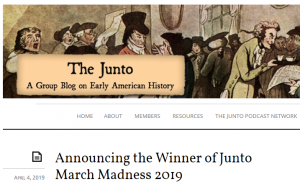by Kara Adams

Who doesn’t enjoy a little friendly competition? That’s the principle behind the annual March Madness bracket hosted by early American history blog The Junto. Run by graduate students and junior faculty, The Junto was started in 2012 and focuses on all aspects of early American history. In addition to posting articles, both by Junto staff and guest contributors, The Junto maintains a bibliography of books published since 2006 relating to early America, publishes its own monthly podcast, the JuntoCast, and provides a list of links to organizations, journals, societies, libraries, and seminars related to the study of early American history. In March, however, the blog’s attention turns to the annual March Madness bracket, which pits early American history resources against each other in a month-long tournament.
Described as “early American history nerdyness [mixed] with basketball geekyness,” the first year of the Junto’s March Madness bracket ran in March 2013, accepting nominations for books focused on the topic of early American history. Since then, each year has had a theme for nominations: books published since 2000 in 2014’s round, primary sources in 2015, journal articles in 2016, and books published since 2014’s competition in 2017. This year’s theme? Digital projects, a theme the announcement post acknowledged is “defined broadly” by the Junto’s staff.
And broad the nominations turned out to be. The final tournament list is composed of eight brackets: Teaching Resources & Podcasts; Empire and Founding Documents; Data Visualization And Geospatial Projects; Blogs and Online Publications; Digital Archives; Newspapers and Ephemera; Transcription and Web Projects; and Digital Editions. The variety of the nominated projects is impressive, ranging from databases of advertisements for runaway slaves, to papers from the Salem Witch Trials, to podcasts with over 200 episodes.
The March Madness competition has exploded in the years since its inception: while the first final boasted “almost 250 unique IP addresses” throughout the competition the total number of votes cast in the 2017 competition was a whopping 8,175 votes. Even more impressive, the current competition is likely to easily surpass those numbers—as of the 2019 bracket’s midpoint at round 3, over 6,000 votes had been cast. (The Junto undertook a full website revamp in 2018, and didn’t run a March Madness bracket that year.) Posts listing the polls have also received around 100 shares each on Facebook, and the Junto generates a hashtag each year for participants to use on Twitter. Voting is fast-paced and anonymous; the polls are posted for two days, with a day in between for the blog’s staff to create the next day’s bracket. The blog’s staff have been sure to note that it’s all for fun, cautioning that resources are vying for the title of “readers’ favorite,” not necessarily “best.” An atmosphere of friendly competition suffuses the comments, and the wide field of nominations is an opportunity for the Junto’s readers to get familiar with resources they may not have known about before.
While all the previous rounds have served the function of an outreach campaign for the Junto itself—and seen some measure of success, if the steadily-increasing number of votes per year is any indication—2019’s tournament is somewhat unique in that it also has the potential to serve as outreach for the projects nominated. Many of the projects are ongoing, and many have creators or staff members interested in spreading the resources they’ve created to the wider public. The March Madness bracket affords the people working on the nominated projects the opportunity to promote their work, and to help spread the resources being created to a wider audience, not just from the Junto’s reader base, but on social media as well. Participants each year are encouraged to use the associated hashtags, and the #JMM19 hashtag has seen regular use on Twitter throughout the duration of the tournament, both from individuals involved in running the nominated projects and from Junto readers promoting their favorite projects.
The 2019 March Madness bracket has concluded, and with a razor thin margin of 52% to 48%, Colonial North America at Harvard Library is walking away with the championship title. While Colonial North America at Harvard Library and its final-round opponent, The Adverts 250 Project, will undoubtedly benefit from the publicity around the championship battle, it’s likely that all 64 projects have reaped some of the outreach benefits from the competition itself—increased social media visibility and exposure to the Junto’s readers has surely had an impact on the projects in the running, and on the Junto’s readership. After six years of sustained growth and increased participation, the yearly competition is certainly a tradition worth repeating.
